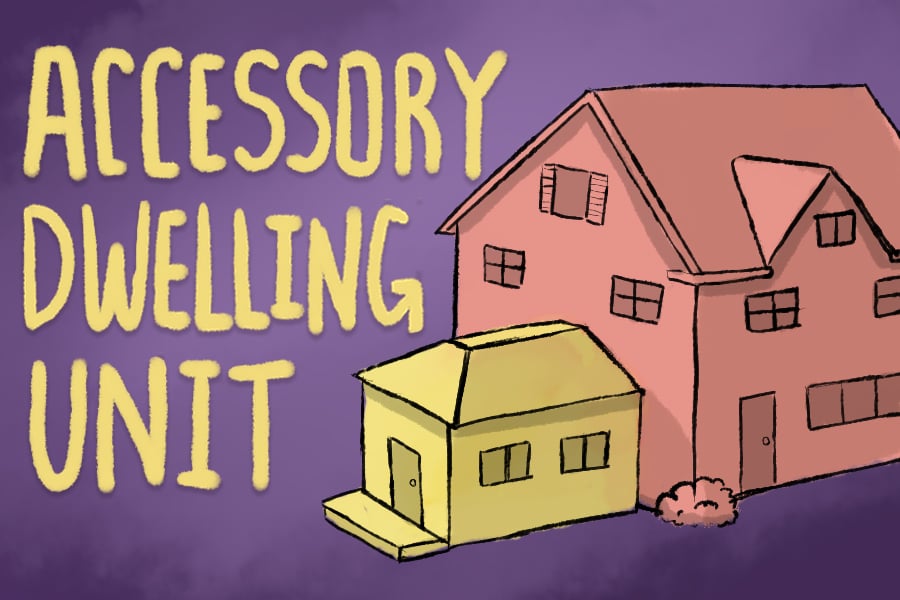Accessory dwelling unit complaints come to life for off-campus students
As they move into off-campus duplexes and triplexes created as accessory dwelling units, many upperclassmen negotiate the tradeoff between outdoor space and worse facilities.
October 18, 2021
At first glance, the most unique part of Weinberg junior Sarah Brown’s off-campus house on Pratt Court is the swirling, colorful paintings decorating the wall next to her staircase.
Perhaps if Brown didn’t live on this particular street in Evanston, the staircase itself — a bulky exterior addition built along the side of the house and leading straight to the second floor — would be more notable in and of itself. But on Pratt Court, Brown’s house joins a long string of duplex and triplex houses occupied by Northwestern students. These lie under civic codes allowing accessory dwelling units, or small contained living spaces, within larger dwellings.
Residents and advocates have long argued that accessory dwelling units, or ADUs, are a particularly intense issue in areas with high concentrations of student housing. A six-month moratorium was proposed on the construction of new internal, non-landlord-occupied ADUs in July. Ald. Clare Kelly (1st) called the developments “mini-dorms” because of their reputation to pack student areas in the First and Second Wards.
Upperclassmen, however, are more than aware that the converted attics and basements they call home have a reputation for being very independent with very bad amenities — and for some, the balance is worthwhile.
For Brown, the social aspects of living in her upstairs ADU outweighed any preferences about living style.
“We didn’t even look anywhere else because we knew that our friends were downstairs,” Brown said. “(The house) is not ideal; there are a lot of things that are missing. But we were kind of going to live here anyway, no matter what happened.”
Brown’s landlord renovated the flooring and repainted the walls before she moved in. Still, she said the house’s age showed. Dirt and odor lingered, and she still wishes she had sprung for a house with a dishwasher.
While Brown said she probably wouldn’t have lived in a duplex on her own, sharing space with her friends downstairs allowed the house to circumvent two of the biggest concerns cited by ADU opponents: noise and privacy. Her house treats the downstairs living room as a relaxation space for everyone, coming together to watch games and use a roommate’s extensive sound system.
Brown said her housemates have received the noise complaints commonly cited by families in ADU-heavy student areas. But for her, the advantages of having a common gathering space in the form of a backyard still justify the pains of the old duplex in her mind.
“I think I’d be definitely way more hesitant to live in a duplex if I didn’t know the other people in the place and not having that same total comfortability with who I’m talking to, who I’m keeping (outside) spaces with,” Brown said.
Ald. Peter Braithwaite (2nd) said at a September City Council Meeting that he hoped, with proper care and a more consistent presence from landlords, ADUs could have a stabilizing influence on neighborhoods. For Weinberg juniors Emily Abt and Natalie Jarrett, a greater connection with their neighbors and the shared lawn was a major draw in their decision to move into a duplex on Foster Street.
“In order to be a part of the community, to have the backyard I wanted with the dog and to be with my friends, I was like, ‘Okay, you know what, I’ll pay this much for a much smaller space,’” Abt said. “But the amount of issues with the house itself were outrageous.”
In the process of signing their lease Abt, Jarrett and their roommate were surprised by constantly changing estimates of how many students the house could accommodate.
The trio ended up committing to split the house’s entire rent three ways. While they had more than enough space, they were surprised to hear that two groups totaling seven people had fit in the space the previous year.
“There was one kind of attic bedroom where I don’t think you could probably stand up straight,” Jarrett said.
Abt and Jarrett continued to face structural issues. Their porch was disconnected from their house, the internal door separating the two duplex units no longer locked and the house had air quality and black mold concerns. They were told they weren’t allowed to open the windows of their apartment to avoid further exacerbating the mold and ended up moving out within a week.
Though Brown plans to stay in her duplex next year, Jarrett isn’t sure she’ll live in a house again. Abt joins the bevvy of Evanston residents calling for better maintenance of ADUs so her experience isn’t repeated by future students.
“They’ll put an extra bedroom in a house,” Abt said, “but that doesn’t take away from the fact that the conditions students are living in are unsafe for them.”
Email: ilanaarougheti2023@u.northwestern.edu
Twitter: @ilana_arougheti
Related Stories:
— City Council tackles affordable housing at Tuesday’s meeting
— Affordable Housing Plan Steering Committee considers smaller developments to integrate housing



